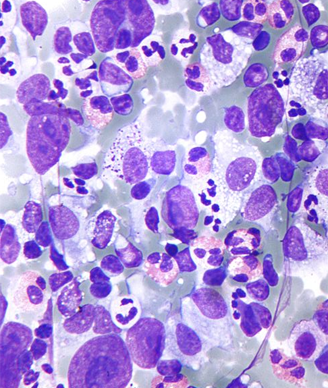Anti–PD-1 Agent Pembrolizumab Promising in Classic Hodgkin Lymphoma
The anti-PD-1 drug pembrolizumab demonstrated promising anti-tumor activity in patients with heavily pretreated classic Hodgkin lymphoma.
Micrograph of Hodgkin lymphoma, copyright Nephron 2010.

SAN FRANCISCO-The anti–PD-1 drug pembrolizumab demonstrated promising anti-tumor activity in patients with heavily pretreated classic Hodgkin lymphoma, according to the results of the phase Ib KEYNOTE-013 study presented here.
“These data support the continued development of pembrolizumab in Hodgkin’s lymphoma,” study presenter Craig Moskowitz, MD, of Memorial Sloan Kettering Cancer Center, said during his oral presentation on Monday.
According to Moskowitz, it is believed that classic Hodgkin’s lymphoma may represent a uniquely vulnerable target for PD-1 blockade. Specifically, amplification of 9p24.1 is frequent in the disease and results in the overexpression of PD-L1 and PD-L2.
The KEYNOTE-013 trial included 31 patients with relapsed or refractory classic Hodgkin lymphoma, including patients who relapsed from or failed brentuximab vedotin treatment. Patients were treated with 10 mg/kg pembrolizumab administered intravenously every 2 weeks.
Twenty-nine patients were included in the analysis presented. The median age of patients was 32 years and the median number of prior therapies was four. All patients had prior brentuximab failure and 20% had prior transplant failure. Twenty-eight percent of patients were considered transplant ineligible. The researchers first assessed response with imaging at week 12.
A high clinical benefit rate was seen with 86% of patients showing response or stable disease. The overall response rate was 66% with 21% of patients achieving complete remission. Partial remission was achieved in 45% of patients and stable disease in 21%. Seventeen of the 19 responses were ongoing as of data accrual for this presentation.
According to Moskowitz, the drug had an acceptable safety and tolerability profile. No grade 4 treatment-related adverse events or deaths were reported. Only three patients experienced moderate treatment-related adverse events.
Pembrolizumab (Keytruda, Merck) has already received FDA breakthrough designation for advanced non–small-cell lung cancer and metastatic melanoma, and is being investigated in a wide variety of other cancers.